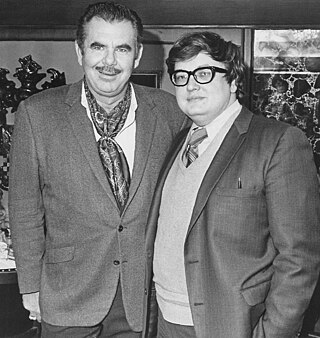
Donald Ervin Knuth is an American computer scientist and mathematician. He is a professor emeritus at Stanford University. He is the 1974 recipient of the ACM Turing Award, informally considered the Nobel Prize of computer science. Knuth has been called the "father of the analysis of algorithms".

Mass media includes the diverse arrays of media that reach a large audience via mass communication.
The Motion Picture Associationfilm rating system is used in the United States and its territories to rate a motion picture's suitability for certain audiences based on its content. The system and the ratings applied to individual motion pictures are the responsibility of the Motion Picture Association (MPA), previously known as the Motion Picture Association of America (MPAA) from 1945 to 2019. The MPA rating system is a voluntary scheme that is not enforced by law; films can be exhibited without a rating, although most theaters refuse to exhibit non-rated or NC-17 rated films. Non-members of the MPA may also submit films for rating. Other media, such as television programs, music and video games, are rated by other entities such as the TV Parental Guidelines, the RIAA and the ESRB, respectively.
Social software, also known as social apps or social platform includes communications and interactive tools that are often based on the Internet. Communication tools typically handle capturing, storing and presenting communication, usually written but increasingly including audio and video as well. Interactive tools handle mediated interactions between a pair or group of users. They focus on establishing and maintaining a connection among users, facilitating the mechanics of conversation and talk. Social software generally refers to software that makes collaborative behaviour, the organisation and moulding of communities, self-expression, social interaction and feedback possible for individuals. Another element of the existing definition of social software is that it allows for the structured mediation of opinion between people, in a centralized or self-regulating manner. The most improved area for social software is that Web 2.0 applications can all promote co-operation between people and the creation of online communities more than ever before. The opportunities offered by social software are instant connections and opportunities to learn. An additional defining feature of social software is that apart from interaction and collaboration, it aggregates the collective behaviour of its users, allowing not only crowds to learn from an individual but individuals to learn from the crowds as well. Hence, the interactions enabled by social software can be one-to-one, one-to-many, or many-to-many.
Media ecology theory is the study of media, technology, and communication and how they affect human environments. The theoretical concepts were proposed by Marshall McLuhan in 1964, while the term media ecology was first formally introduced by Neil Postman in 1968.
New media are communication technologies that enable or enhance interaction between users as well as interaction between users and content. In the middle of the 1990s, the phrase "new media" became widely used as part of a sales pitch for the influx of interactive CD-ROMs for entertainment and education. The new media technologies, sometimes known as Web 2.0, include a wide range of web-related communication tools such as blogs, wikis, online social networking, virtual worlds, and other social media platforms.

Parental controls are features which may be included in digital television services, computers and video games, mobile devices and software that allow parents to restrict the access of content to their children. These controls were created to assist parents in their ability to restrict certain content viewable by their children. This may be content they deem inappropriate for their age, maturity level or feel is aimed more at an adult audience. Parental controls fall into roughly four categories: content filters, which limit access to age inappropriate content; usage controls, which constrain the usage of these devices such as placing time-limits on usage or forbidding certain types of usage; computer usage management tools, which enforces the use of certain software; and monitoring, which can track location and activity when using the devices.
In media studies, mass communication, media psychology, communication theory, and sociology, media influence and themedia effect are topics relating to mass media and media culture's effects on individuals' or audiences' thoughts, attitudes, and behaviors. Through written, televised, or spoken channels, mass media reach large audiences. Mass media's role in shaping modern culture is a central issue for the study of culture.
Children's culture includes children's cultural artifacts, children's media and literature, and the myths and discourses spun around the notion of childhood. Children's culture has been studied within academia in cultural studies, media studies, and literature departments. The interdisciplinary focus of childhood studies could also be considered in the paradigm of social theory concerning the study of children's culture.
A content rating rates the suitability of TV shows, movies, comic books, or video games to this primary targeted audience. A content rating usually places a media source into one of a number of different categories, to show which age group is suitable to view media and entertainment. The individual categories include the stated age groups within the category, along with all ages greater than the ages of that category.
Graphic violence refers to the depiction of especially vivid, brutal and realistic acts of violence in visual media such as film, television, and video games. It may be real, simulated live action, or animated.
The Recreational Software Advisory Council (RSAC) was an independent, non-profit organization founded in the U.S. in 1994 by the Software Publishers Association as well as six other industry leaders in response to video game controversy and threats of government regulation.
In media discourse, sexual content is material depicting sexual behavior. The sexual behavior involved may be explicit, implicit sexual behavior such as flirting, or include sexual language and euphemisms.
Medium theory is a mode of analysis that examines the ways in which particular communication media and modalities impact the specific content (messages) they are meant to convey. It Medium theory refers to a set of approaches that can be used to convey the difference in meanings of messages depending on the channel through which they are transmitted. Medium theorists argue that media are not simply channels for transmitting information between environments, but are themselves distinct social-psychological settings or environments that encourage certain types of interaction and discourage others.

A video game content rating system is a system used for the classification of video games based on suitability for target audiences. Most of these systems are associated with and/or sponsored by a government, and are sometimes part of the local motion picture rating system. The utility of such ratings has been called into question by studies that publish findings such as 90% of teenagers claim that their parents "never" check the ratings before allowing them to rent or buy video games, and as such, calls have been made to "fix" the existing rating systems. Video game content rating systems can be used as the basis for laws that cover the sales of video games to minors, such as in Australia. Rating checking and approval is part of the game localization when they are being prepared for their distribution in other countries or locales. These rating systems have also been used to voluntarily restrict sales of certain video games by stores, such as the German retailer Galeria Kaufhof's removal of all video games rated 18+ by the USK following the Winnenden school shooting.

Film criticism is the analysis and evaluation of films and the film medium. In general, film criticism can be divided into two categories: Academic criticism by film scholars, who study the composition of film theory and publish their findings and essays in books and journals, and general journalistic criticism that appears regularly in press newspapers, magazines and other popular mass-media outlets; Academic film criticism rarely takes the form of a review; instead it is more likely to analyse the film and its place in the history of its genre, the industry and film history as a whole.
In communication, media are the outlets or tools used to store and deliver content; semantic information or subject matter of which the media contains. The term generally refers to components of the mass media communications industry, such as print media, publishing, news media, photography, cinema, broadcasting, digital media, and advertising.
Anne Fernald is an American psychologist. She serves as the Josephine Knotts Knowles Professor in Human Biology at Stanford University and has been described as "the leading researcher in infant-directed speech".

Stephen Balkam is an American writer, policy advocate, and nonprofit leader. Balkam is the founder and CEO of the Family Online Safety Institute (FOSI). FOSI's mission is to make the online world safer for kids and their families. FOSI convenes the top thinkers and practitioners in government, industry and the nonprofit sectors to collaborate, innovate and create a Culture of Responsibility in the online world.
Media consumption or media diet is the sum of information and entertainment media taken in by an individual or group. It includes activities such as interacting with new media, reading books and magazines, watching television and film, and listening to radio. An active media consumer must have the capacity for skepticism, judgement, free thinking, questioning, and understanding. Media consumption is to maximize the interests of consumers.






